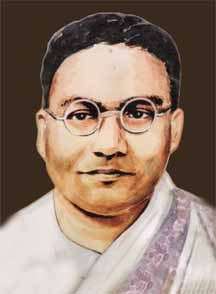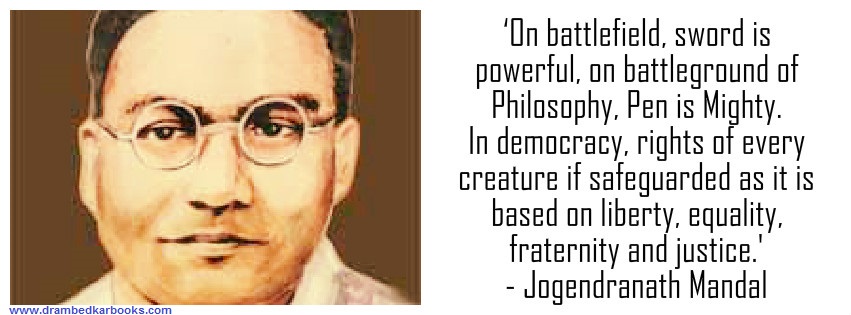
29th January in Dalit History – Birth Anniversary of Jogendranath Mandal
Today is the birth anniversary of Mahapran Jogendernath Mandal (1904-1968) a man today largely forgotten except living in the imagination of Bahujan community was a learned person from Bengal. As the leader of Scheduled Caste Federation in Bengal forged an alliance with Muslim League and mobilised numbers to get Babasaheb elected to the constituent assembly from Bengal. Similar to Babasaheb, he too went on to become the first Minister of Law and Labour of independent Pakistan. Later, he too resigned due to the differences and discomfort arouse on multiple issues. According to him, ‘On the battlefield, the sword is powerful, on the battleground of Philosophy, Pen is Mighty. In a democracy, rights of every creature if safeguarded as it is based on liberty, equality, fraternity and justice’. Let’s strive to carry on his dream of creating social and economic equality in India and establish a Bahujan rule in India.
Read also – Dalit History Month – Remembering Jogendra Nath Mandal

Jogendra Nath Mandal was the leader of Scheduled Caste communities in Bengal, born in an untouchable Namasudra family. He was the son of Ramdayal Mandal and Sandhyadebi. He passed his B.A examination in 1932 from B.M College located in Barisal then he joined Calcutta Law College and passed the Law examination in 1934. He was the member of Bengal Legislative Assembly 1937 from the Bakarganj North-East General Rural Constituency.
Subsequently, he developed political connections with Dr Ambedkar and also entered into a political alliance with the Muslim League. Jogendranath was appointed as the Minister for Co-operative Credit and Rural Indebtedness. In the meantime, he founded the Bengal branch of the All India Scheduled Castes Federation (AISCF). He joined Suhrawardy Ministry as the Law, Pull Worker and Construction of House Minister in 1946.
Towards the end of 1946, Jogendranath almost single-handed ensured the election of Dr Ambedkar from Bengal to the Constituent Assembly.

On the eve of the partition of India Jogendranath Mandal supported Huseyn Shaheed Suhrawardy, Sarat Chandra Bose and others for a United Bengal. With Mountbatten’s announcement of the partition plan on 3 June 1947, however, he lent support for Pakistan. He was one of the central and leading Founding Fathers of the modern state of Pakistan.
Following the partition of India on August 15, 1947, Mandal became a member and temporary chairman of the Constituent Assembly of Pakistan and agreed to serve as the new state’s first Minister for Law and Labour – becoming the highest-ranking Hindu member of the government. An Indian and later Pakistani statesman who served as the first minister of law and labour in Pakistan. As a leader of the Scheduled Castes, Jogendranath had made common cause with the Muslim League in their demand for Pakistan, hoping that the Scheduled Castes would be benefited from it. From 1947 to 1950 he lived in the port city of Karachi, which became Pakistan’s capital.
He came back to India a few years after partition after submitting his resignation to Liaquat Ali Khan, the then Prime Minister of Pakistan. During the years from 1950 to 1968, he continued to plead for the rights of the underprivileged sections in the society.
Watch Video – Dr. Ambedkar’s letter to Jogendranath Mandal.



dear pardeep.jai bheem i happy to see this blog…i have written a book on mahapran jogendra nath mandal in kannada i am thinking to release it in april….i need some informations about mandal sahebs family which does not covered in the book…give me your mobile number if possible call i want to discuss about this project…jai bheem jai bharath
I am sorry, I don’t think I will be much useful here as I don’t know much about him. Jai Bhim.
Dr.B.R.Ambedkar resigned from government because of ideological and personalo differences. but Jogendranath Mondal was attacked and humilated during 1950 east pakistan riots, because of which, he was forced to resign and return to india. if this had not happened, he would surely remain there in his homeland.
He is also inspiration for Bahujans (BC SC ST Minorities )..
thanks a lot for introducing a forgotten Hero….wonderful job sir
Thank you so much for the comment and nice words. Much appreciate. Jai Bhim